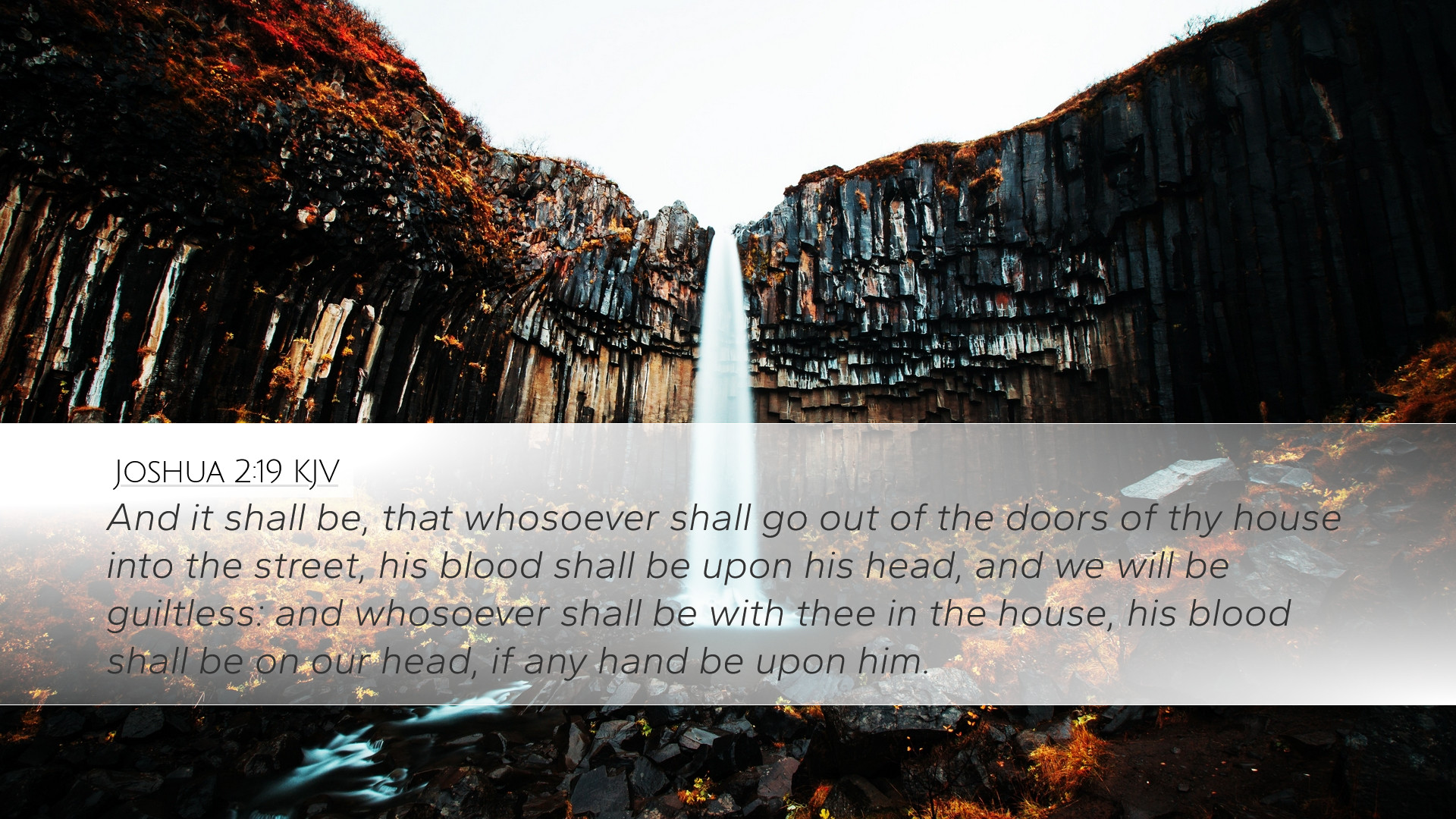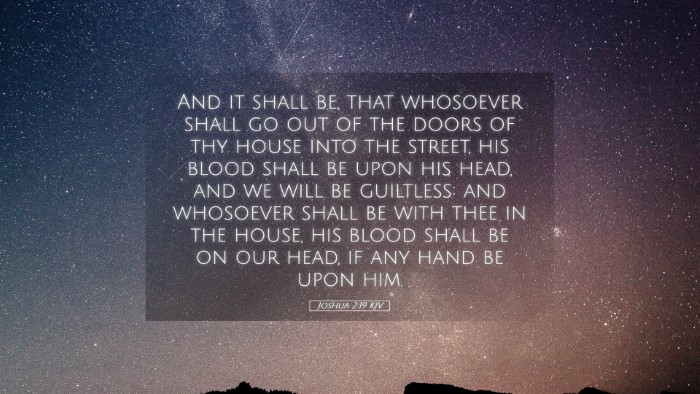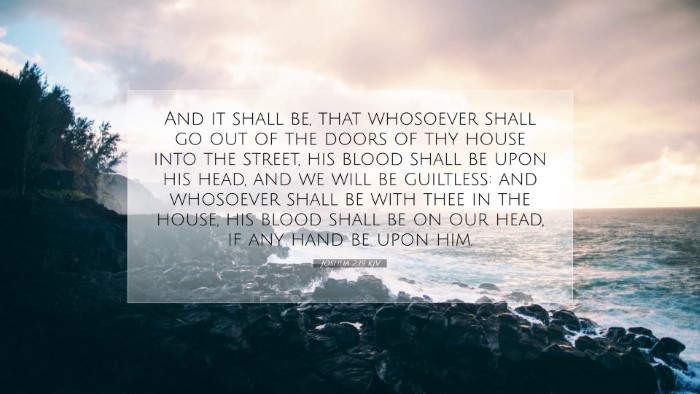Old Testament
Genesis Exodus Leviticus Numbers Deuteronomy Joshua Judges Ruth 1 Samuel 2 Samuel 1 Kings 2 Kings 1 Chronicles 2 Chronicles Ezra Nehemiah Esther Job Psalms Proverbs Ecclesiastes Song of Solomon Isaiah Jeremiah Lamentations Ezekiel Daniel Hosea Joel Amos Obadiah Jonah Micah Nahum Habakkuk Zephaniah Haggai Zechariah MalachiJoshua 2:19
Joshua 2:19 KJV
And it shall be, that whosoever shall go out of the doors of thy house into the street, his blood shall be upon his head, and we will be guiltless: and whosoever shall be with thee in the house, his blood shall be on our head, if any hand be upon him.
Joshua 2:19 Bible Commentary
Commentary on Joshua 2:19
Verse: "And it shall be, that whosoever shall go out of the doors of thy house into the street, his blood shall be upon his head, and we will be guiltless: and whosoever shall be with thee in the house, his blood shall be on our head, if any hand be upon him."
Introduction
This verse emerges in the broader narrative of the Israelite spies sent into Jericho, highlighting themes of covenant, salvation, and the grave implications of choices. Understanding this verse deeply involves exploring its context in the Book of Joshua, the historical situation, and the theological implications presented by various biblical commentators.
Contextual Analysis
Joshua 2 recounts the secretive mission of two Israelite spies who are sheltered by Rahab, a harlot in Jericho. This act of refuge is significant, as it intertwines themes of faith and deliverance with the imminent judgment of the city. Rahab's negotiation with the spies culminates in the covenant described in verse 19, emphasizing the duality of salvation and judgment.
Matthew Henry’s Perspective
Matthew Henry highlights the solemnity of the agreement between the spies and Rahab. He notes that the spies' warning underscores a clear dichotomy: those who remain within the safety of Rahab's house are spared, while those who venture out into the streets face inevitable doom. This reflects both a physical and spiritual condition of being 'inside'—symbolizing safety—and 'outside'—representing impending destruction.
Albert Barnes’ Insights
Albert Barnes emphasizes the conditional nature of the assurance given to Rahab. He notes that her act of faith in hiding the spies provides her and her family a unique protection. Barnes further elaborates on the significance of Rahab’s house being marked by the scarlet thread, representing the blood of salvation. The warning serves as a mechanism of personal responsibility; individuals' actions determine their fate, thus illustrating the themes of free will and divine justice.
Adam Clarke’s Commentary
Adam Clarke brings forth a detailed examination of the implications surrounding the phrase “his blood shall be upon his head.” Clarke points out that this ancient legal principle signifies personal accountability for one’s actions. The spies’ declaration establishes a clear guideline for how Rahab's family could secure their salvation—demonstrating that God’s mercy is accessible to those who act in faith.
Theological Implications
The themes rooted in Joshua 2:19 resonate with deeper theological concepts including covenantal faithfulness, divine mercy, and the juxtaposition of judgment and salvation.
- Covenantal Relationships: The pact between Rahab and the spies signifies the nature of God's covenant with humanity. Rahab's inclusion foreshadows the broader plan of redemption, where faith in action invites divine mercy.
- Personal Responsibility: The clear demarcation of safety within Rahab's household and punishment for those outside teaches about individual accountability before God. Personal choices carry significant weight in matters of salvation.
- Judgment and Mercy: The chosen terminology highlights God's justice—salvation for those who believe and seek refuge, while judgment lands upon those who disregard the warning. This creates an urgent call to faith and obedience.
Practical Applications
For pastors, students, theologians, and scholars, Joshua 2:19 serves as a profound reminder of the lessons drawn from ancient Israel's narratives. Here are several applications:
- Emphasizing Faith in Action: The faith demonstrated by Rahab reflects the essence of active faith. Believers today are called to not only hear the Word but to respond in ways that bear witness to their faith.
- Understanding the Nature of God’s Mercy: The inclusion of Rahab—a Gentile and a sinner—reinforces that God’s mercy is vast and extends beyond cultural and moral boundaries, offering hope to all who believe.
- Teaching the Significance of Choices: Drawing parallels between physical and spiritual choices, churches can communicate the importance of remaining "inside" the safety that God provides, which can be a powerful and convicting message.
Conclusion
Joshua 2:19 presents a rich tapestry of themes that, when explored deeply, provide not just historical context, but also a fresh understanding of God’s nature and human responsibility. It compels readers to reflect on their own covenantal relationship with God and the importance of responding to His call. The reassurance of safety through faith becomes a timeless theme, relevant for every generation of believers.


